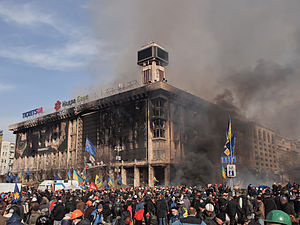 Damascus, February 22 – In the wake of a popular uprising in Ukraine that resulted in the deposing of Viktor Yanukovich as president, leaders throughout the Middle East are expressing bewilderment that the authorities in Kiev did not immediately resort to crushing dissent with machine guns, tanks, air strikes, and mass torture.
Damascus, February 22 – In the wake of a popular uprising in Ukraine that resulted in the deposing of Viktor Yanukovich as president, leaders throughout the Middle East are expressing bewilderment that the authorities in Kiev did not immediately resort to crushing dissent with machine guns, tanks, air strikes, and mass torture.
Following months of protests that turned violent in recent weeks, Yanukovich fled the capital city but insisted he remains the country’s legitimate elected leader despite being deposed by Parliament today. Egyptian, Saudi, Bahraini, Syrian, Turkish, and Iranian officials said they still did not understand why the Ukrainian government allowed the protests to continue after the initial unrest in November.
At the time, Yanukovich opted to reject closer economic ties with the European Union and instead accepted Russian overtures and loans, a move that had given Mideast despots the impression that Ukraine would also lean toward their, and Russia’s, preference for repressing opposition by bloody means sooner rather than later.
“We actually feel betrayed, is how to phrase it,” said Basher Assad of Syria, who is currently fighting a three-year-old insurgency that has seen the use of all of the aforementioned techniques, plus chemical weapons and gasoline-fueled barrel bombs. “It makes me uncomfortable knowing that the support of other repressive regimes doesn’t guarantee that the recipient of that support will always be as brutal as necessary to retain power.”
Syria has enjoyed the backing of Russia, but also of Iran, which sought to reassure Assad in the aftermath of Yanukovich’s setback by doubling the quantity of propaganda from Tehran that paints the Syrian opposition as a tool of Zionists.
The developments in Ukraine have also complicated Cairo’s pivot toward Moscow as the US disengages from the region. “We of course support the people,” said Egyptian Minister of Defense Abdel Fattah al-Sisi, de facto leader of the country since the removal of Mohammed Morsi from office last year. “Unless the people challenge our legitimacy.” He defended continued repression of protests and the harsh collective measures taken against residents of the Sinai peninsula as necessary elements of the effort to demonstrate to Russia that material support would be applied as Putin expects. Al-Sisi anticipates that if Ukraine dislodges itself from Moscow’s sphere of influence, his country will be more than willing to serve as an alternative proving ground for the violent crushing of dissent.
At press time, Chinese officials were wondering aloud whether the news was some sort of joke.




